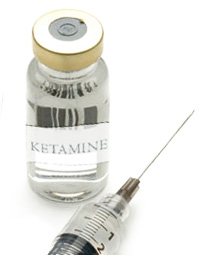Medical Drug Hallucinogens
Ketamine

Ketamine is primarily used as a veterinary anesthetic. It was developed as a human anesthetic, but its use was largely discontinued after patients had too many adverse effects, including delirium, irrational behavior, hallucinations and confusion. It is occasionally still used as a human anesthetic when it would be dangerous to lower a person’s respiration or heart rate, for example, when they are trapped in a damaged car or collapsed building.
Ketamine is a dissociative drug, which means that a person abusing it loses touch with his own thoughts and identity. He (or she) may feel that someone else is having his thoughts. He may feel completely separated from his own body. A state of complete dissociation is sought by some addicts. They will keep taking more of the drug until they reach this oblivious state, called the “k-hole.”
Ketamine effects:
- Distortion of sight and sound
- Feelings of detachment from the environment and oneself
- Illusions
- Hallucinations
- Nausea
- Slowed breathing
- Vomiting
- Dizziness
- Confusion
- Slurred speech
- Sedation
- Numbness
- Weakness
- Visual problems
- Muscle rigidity
- Aggressive behavior
- Loss of coordination
- Rapid heart rate
- Amnesia
- Delirium
Hallucinatory effects of ketamine last an hour or less, but a user’s judgment, coordination and perception may be affected much longer. Some people suffer flashbacks after using this drug. It is possible to die from an overdose of ketamine. Ketamine can be injected, snorted or smoked. It is sometimes mixed with marijuana and smoked. Ketamine may be a white powder, small round pills or bottles of injectable liquid labeled with brand names shown below.
Ketamine may be used as a date rape drug. It is tasteless and odorless. A person raped after being given ketamine may not even remember that it happened.
Ketamine nicknames:
Special K, Vitamin K, Super K, Jet, Super Acid, kitty, cat valium, honey oil, Kit Kat, K, Special La Coke
Brand names: Ketaved, Ketaset, Vetamine, Vetalar, Ketalar
Use of ketamine with other drugs, including alcohol, benzodiazepines like Xanax, barbiturates or opiates is particularly dangerous and can result in death. Heavy use of ketamine can result in damage or even destruction of the bladder, resulting in severe pain during urination and need for surgical removal of the bladder.
Ketamine is frequently stolen from veterinary clinics. Its use is highly restricted and illicit use is illegal.
Tryptamines
Tryptamines are synthetic substances with effects similar to psilocybin (magic mushrooms). Many substances in this category are not included on any specific list of outlawed drugs. Their use leads to a hallucinatory state with distortions of sight, sound and time. The user will be unable to make sensible, rational judgments and thus is more likely to be injured. He may suffer amnesia but this may subside. Panic attacks are common. A person with underlying mental conditions is particularly at risk of damage from these drugs. Effects may last 12 to 24 hours. Unpleasant effects can include anxiety, restlessness, muscle tension to the point of muscle tissue breakdown, jaw tightness, confusion, nausea and vomiting.
Appearance:
They are often packaged as a light colored powder in small plastic packs labeled as “research chemicals.” They are readily available online.
Names of drugs in this class include:
- Alpha-O (5-MeO-DMT)
- Foxy-methoxy (5-MeO-DPT)
- AMT (Alpha-methyltryptamine)
- 5-HTP.52
 ®
®